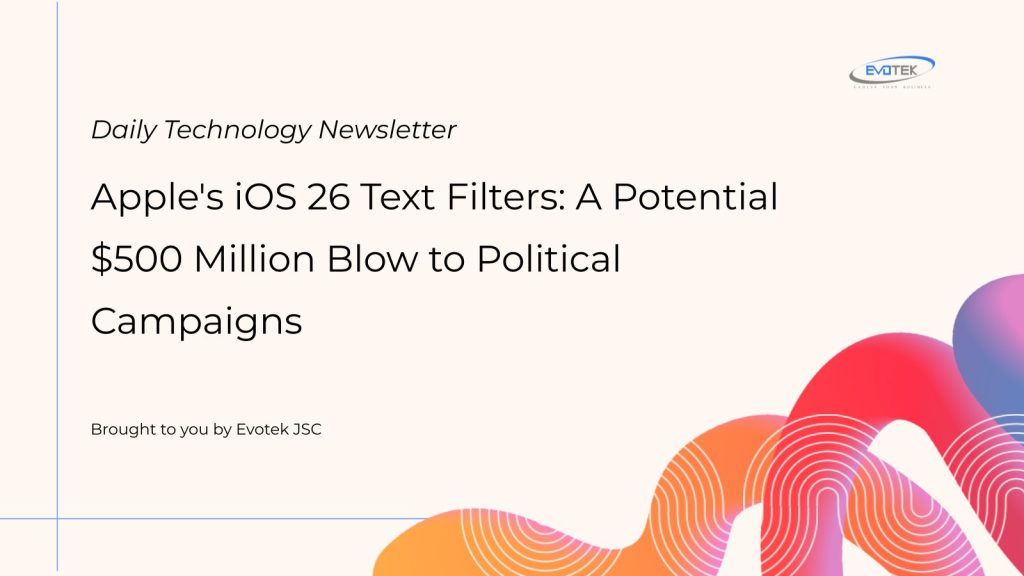A significant change arriving with Apple’s upcoming iOS 26 operating system is sparking alarm across the political landscape, particularly within Republican campaign committees. The new feature, designed to enhance user privacy and reduce spam, could inadvertently cost political campaigns hundreds of millions of dollars by severely impacting their ability to fundraise and mobilize voters via text messaging.
Understanding Apple’s New Text Filtering Feature
iOS 26 introduces an enhanced text message filtering capability that automatically directs incoming messages from unrecognized numbers into a dedicated “Unknown Senders” folder. Crucially, these filtered messages will not trigger a notification on the user’s device. Instead, users must manually navigate to this folder to view, mark as known, or delete the messages.
Apple senior executive Darin Adler, speaking at the Worldwide Developers Conference in June, characterized the feature as empowering users with “total control over who appears in your conversation list.” He also noted that important time-sensitive messages, such as verification codes or scheduling alerts, would still be visible.
GOP Warns of Staggering Financial Losses
The National Republican Senatorial Committee (NRSC), the official campaign arm responsible for electing GOP senators, has issued a stark warning regarding the financial implications of this iOS 26 update. In an internal memo, the NRSC projected that the new filtering feature could lead to a staggering $500 million loss for Republican campaigns nationwide.
The committee estimates its own direct revenue loss from the change could be as high as $25 million. This projection is based on the significant reliance of campaigns on text message donations, with an estimated 70% of small-dollar contributions originating from texts. Furthermore, iPhones account for approximately 60% of all mobile devices in the United States, amplifying the potential impact.
Campaigns Rely Heavily on Text Messaging
Political campaigns, across both Republican and Democratic parties, heavily leverage text messages not only for fundraising but also for crucial “Get-Out-The-Vote” (GOTV) efforts. While some individuals may opt-in to receive campaign messages, a substantial volume of texts are sent to individuals who have not explicitly subscribed, often through purchased contact lists.
Joanna Rodriguez, a spokesperson for the NRSC, strongly criticized the impending rollout, stating, “Unilaterally blocking campaigns and political parties from being able to contact voters with get-out-the-vote or persuasive messaging is voter disenfranchisement.” The NRSC is urging Apple to delay the feature’s release until these concerns are adequately addressed.
Urgent Call for Action and Diverse Perspectives
With iOS 26 expected to roll out in mid-September, the NRSC memo expressed a sense of urgency, noting that there is a “very narrow window to fix this” and that lobbying groups had been “asleep at the wheel.” Apple has yet to comment publicly on the concerns raised by political groups.
Meanwhile, some Democratic strategists offer a different perspective. Mike Nellis, founder of the Democratic digital fundraising firm Authentic, believes that while the change warrants attention, “good-faith actors won’t see as much of a hit.” Nellis added a pointed critique: “If you’re panicking about losing $500 million in revenue, it probably means you were scamming people in the first place.”
Nellis’s commentary underscores the importance for campaigns to cultivate a diverse array of fundraising and communication channels, ensuring resilience against regulatory shifts or platform changes. The debate highlights the ongoing tension between user privacy and the traditional methods employed by political organizations to engage with the electorate.

 日本語
日本語 한국어
한국어 Tiếng Việt
Tiếng Việt 简体中文
简体中文